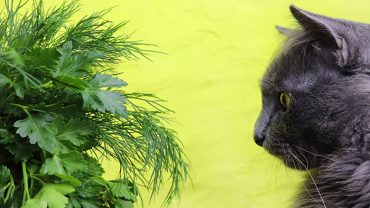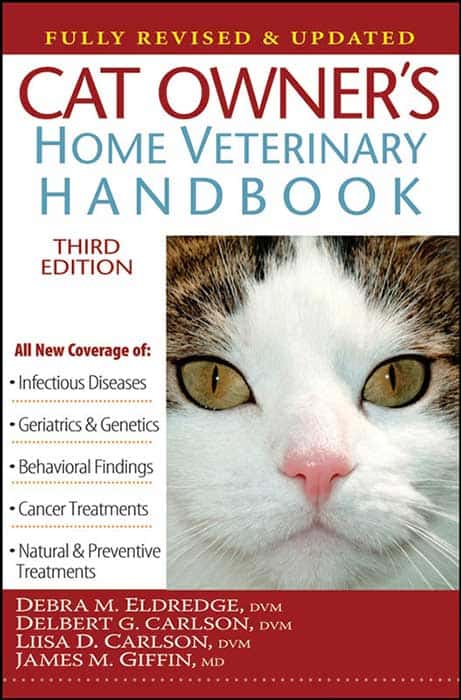Can Cats Eat Dill?
If you frequently use dill, you may have wondered whether the herb is safe for your cat, considering that experts generally discourage pet owners from offering plant matter to their furry, little ones.
The short answer is yes, cats can eat dill. Unlike most other herbs, dill isn’t toxic to cats. As a matter of fact, the fresh and dried leaves of the plant are highly encouraged.
However, you should only offer dill to your cat in moderation and as an occasional treat. Read on for more insights on the topic.
Table of Contents
About Dill
Dill, also known as Anethum graveolens refers to an aromatic herb that’s indigenous to South-Eastern Europe and the Mediterranean regions.
The plant belongs to the Apiaceae family, a unit that also comprises parsley, cumin, anise, coriander, celery, carrot, to mention but a few.
The fresh leaves, as well as the immature flower clusters of dill, are used to make salads and soups, as well as to prepare other dishes. The plant delivers a flavor similar to that of caraway.
Besides the leaves and immature flowers, the dried seeds of dill may also be used to season various kinds of foods.
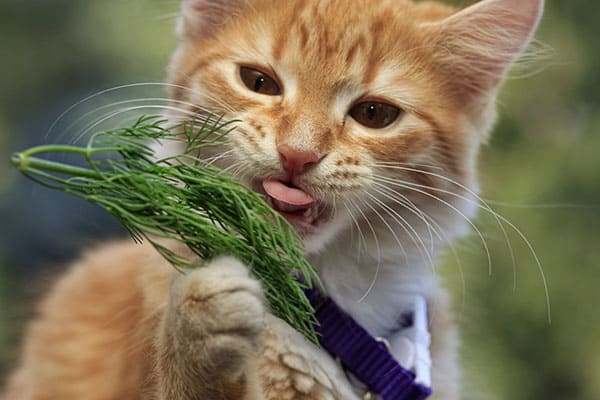
Possible Health Benefits of Dill for Your Cat
Is it safe for cats to eat dill? One of the best ways to answer that question is to examine all the possible health benefits of this herb.
The following are some of the various ways your cat could benefit from eating dill.
1. Packs Numerous Antioxidants
The leaves and seeds of dill contain many antioxidants. These antioxidants help to ward off different kinds of diseases, such as heart disease, diabetes, arthritis, and various forms of cancer.
Some of the antioxidants in dill include;
– Terpenoids – They protect your cat from diseases affecting its vital organs (the heart, liver, brain, and kidneys).
– Flavonoids – They fight off diseases of the heart and brain, as well as stroke and various forms of cancer.
– Tannins – Contain antimicrobial effects, and generally boosts your cat’s immunity.
2. Improve the Health of Your Heart
We’ve already highlighted a few compounds in dill that might help to promote a healthy heart.
According to multiple studies, the flavonoids found in dill pack immense antioxidant and anti-inflammatory properties, which make them useful in reversing the risk factors for heart disease.
Some of these risk factors include triglyceride, elevated blood pressure, chronic inflammation, and high LDL cholesterol.
3. Regulation of Blood Sugar Levels
Like humans, cats also suffer from various blood sugar-related conditions, such as diabetes.
Most cat owners are usually cautious enough, and regularly monitor the diet of their cats to ensure it doesn’t contain any potential triggers for feline diabetes. But as they say, you can never be too careful.
Diabetes presents serious dietary and lifestyle challenges for your cat. As for you, those insulin injections don’t come cheap either.
Thankfully, research points out to dill’s potential to prevent or reverse diabetes. You can offer this herb occasionally to your feline friend to keep it safe from this debilitating condition.
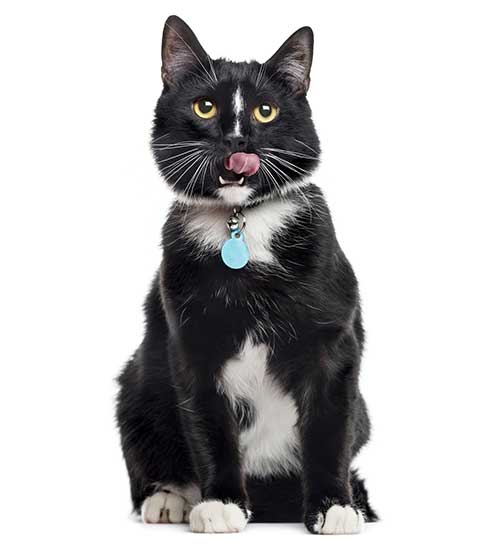
Besides these three main benefits, there are various other ways your cat might benefit from occasional treats of the herb.
Dill contains monoterpenes, which is a class of terpenes that are touted for their antifungal, anti-inflammatory, antiviral, and anticancer properties.
One monoterpene present in the vegetable, known as d-limonene, has specifically been cited for its ability to fight malignant tumors.
Dill also contains many other minerals that affect the body in various ways. Examples include magnesium, phosphorus, and calcium.
Will Your Cat Enjoy All The Health and Nutritional Benefits of Dill?
After having examined all the possible ways that cats could benefit from eating dill, you may be tempted to readily offer the herb to your cat. Well, not so fast.
Before you proceed, another crucial question that you must settle is, will my cat actually benefit from eating dill?
Sadly, your cat will not utilize all the nutritional elements that are present in dill. That’s because at the end of the day, cats are obligate carnivores, not omnivores.
Being an obligate carnivore means that your cat derives all its nutritional elements from a diet of animal protein. Unlike humans who must eat a balanced diet that consists of flesh, grains, and greens, a cat’s balanced diet purely constitutes meat.
That implies the nutrients present in dill do not interact with your feline’s body the same way they interact with yours.
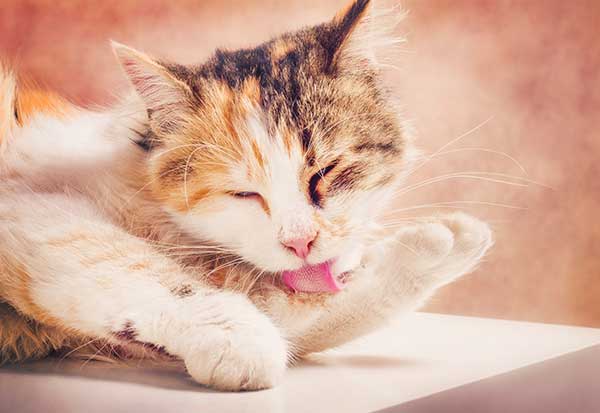
Even better, the bodies of cats are designed to naturally synthesize some of the minerals that they cannot get from their regular diet of meat. An example is vitamin C.
Also, remember that the digestive system of cats lacks the right enzymes to process fibrous plant matter. Therefore, feeding dill to your cat may cause severe gastrointestinal complications, including bloating, diarrhea, and gas.
What Dill Can Cats Eat?
As is the case with any plant matter, dill consists of leaves, stems, flowers, and seeds.
Even after reviewing all the health and nutritional properties of the herb, it would be naïve to believe that any part of the plant is safe for cats.
As we’ve already highlighted, the fresh and dried leaves of the herb, as well as its flowers, are considered safe for cats. However, you should never offer dill stems or seeds to your feline friend, and for the obvious reasons.
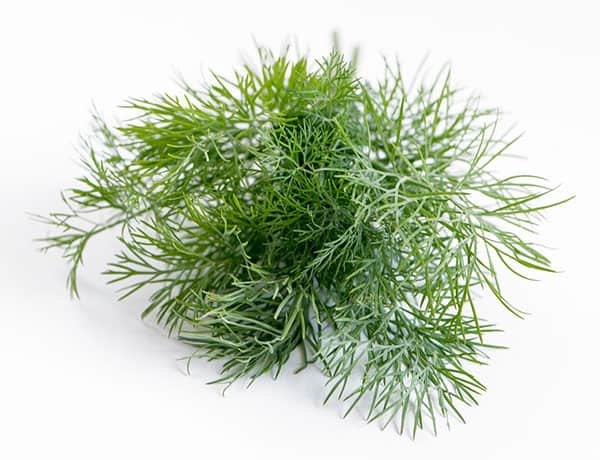
? The stems and seeds of dill are quite hard to digest. Therefore, they present a choking hazard. Remember, your cat won’t take all its time chewing the hard fibers, and may be forced to swallow it whole. Even if the cat doesn’t choke on dill seeds or stems, its stomach will not digest these substances, leading to abdominal pains.
Besides the various parts of the plant, there’s also the question of preservation. And you might be wondering, can cats eat dill pickles?
Dill pickles primarily contain brine, sugar, vinegar, and in some cases, garlic. These are some of the very foods that are considered toxic to cats. Therefore, cats should not eat dill pickles.
And what about dill essential oil?
Dill essential oil contains various compounds that are considered harmful to pets. Examples are ketones and alpha-pinene. In addition, the oil may cause skin irritation.
So, how should I serve dill to my kitto?
The best way to offer dill to cats is to boil or steam the herb plain, without adding any spices or condiments. Then, you can serve it to the cat either as a standalone meal or mixed into the cat’s regular diet.
You can also serve fresh dill to the cat. In such cases, it’s more prudent to mix the herb into the cat’s food.
What Could Go Wrong If My Cat Eats Dill?
First off, let’s reiterate that little servings of dill are unlikely to present any adverse effects for your feline friend.
However, the cat might suffer from a couple of gastrointestinal complications if it eats more than the recommended portions.
Examples of these conditions include;
-
- Nausea,
- Vomiting,
- Gas,
- Diarrhea, and
- Abdominal pains.
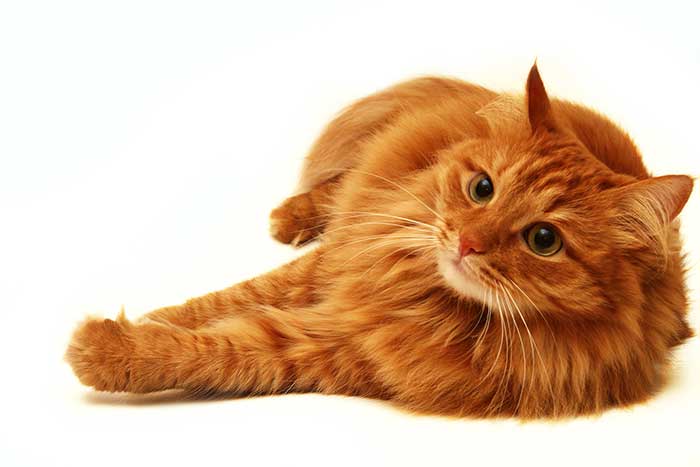
If the cat is allergic to the herb, you can also expect symptoms like an itchy mouth, teary eyes, swollen throat, and bumps on its tongue.
Most of these conditions should go away after a few hours, or even sooner if you apply some home remedies like rehydration. If they don’t, take your cat to the vet immediately.
So, Is Dill Dangerous For Cats?
Like most plants in the Apiaceae family, dill is absolutely safe for cats. The problem comes when you want to feed dill to your kitto like the herb is part of the cat’s staple diet.
Remember, cats are obligate carnivores, and should only eat plant matter occasionally as treats.

